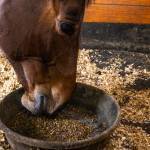Athletic Performance Affects Horse Hormone Levels

A plethora of hormones released during exercise impact athletic performance, but new research is explaining which hormones are important and exactly how they affect performance.
To glean more information on this topic, Polish researcher Witold Kedzierski* measured leptin levels in horses following various types of exercise. Leptin is an adipokine, a hormone released from fat tissuethat helps control energy metabolism, appetite, and food intake in animals. Specifically, high leptin levels have been shown to decrease appetite.
Leptin levels are influenced by the levels of natural corticosteroids (e.g., cortisol, the stress hormone) and catecholamine (e.g., epinephrine and other hormones produced by the adrenal glands). Corticosteroids stimulate leptin secretion, whereas catecholamines inhibit leptin. Interestingly, both corticosteroids and catecholamines increase in horses during exercise. This likely contributes to the identification of all variations (increase, decrease, or no change) in leptin levels in exercising horses.
To help clarify the effect of different types of exercise on leptin levels, and therefore performance, Kedzierski studied 38 horses, including six dressage stallions, 12 jumping stallions, 12 Thoroughbreds, and eight light draft horses used in agriculture.
Key findings included:
- Leptin levels were only increased in the light draft horses (a 60% increase), which was the only group with long-lasting, low-intensity exercise regimens;
- No change in leptin was noted in horses undergoing short-term, intensive, or technical exercise;
- Cortisol levels were only increased in the light draft horses and racing Thoroughbreds; and
- The short-term, transient increase in leptin was associated with changes in cortisol release during exercise.
Kedzierski concluded, “Better understanding of the regulation of leptin released during exercise could contribute towards improving the performance and state of health of exercising horses.”
*Kezierski, W. 2014. Changes in plasma leptin concentration during different types of exercises performed by horses. Animal 8(9):1456–1461.








